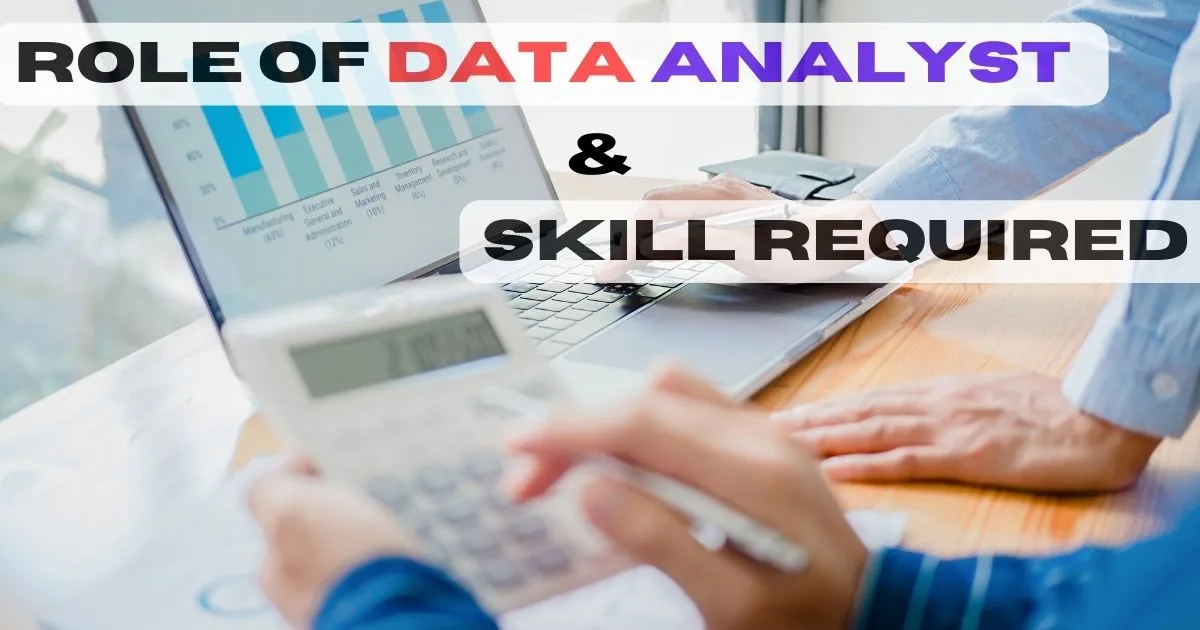What is the role of Data Analyst ?
Data Analyst plays an important role in the world of business and technology. Their job is to extract important and hidden figures from large data so it can be useful for businesses and organizations in decision making. In today’s scenario data is like gold.
An organization that has an authentic data bank can be a winner and an expert data analyst can get gems out of that data as per the organization’s requirements to take decisions on that data. For example, for a business which product can be launched and which product to reduce or stop production? For a political party which candidate can win so that the party can give a ticket? So what are the role of data analysts . These are a few examples.

Let us understand the role of a data analyst :-
- Data Collection: Collecting data from various sources is one of the important jobs for data analysts i.e. gathering data from organization reports, websites, social media, etc, or even from databases from data banks.
- Data Cleaning: Raw data can be cluttered and the task of a data analyst is to sort and organize the data, making it accurate and error-free.
- Data Analysis: Now it’s time to examine the data using software tools. This can be used to find the trend, pattern, or some hidden answer.
- Data Interpreting: Once the data is analyzed, the data analyst has to explain what this data means & how it will be helpful for the business.
- Data Presentation: Data can be complex and not everyone can understand it, so data analyst has to present the data in a storytelling pattern like charts, graphs, and maps & everyone can understand this visual data. This helps the management to come on to some conclusion to make proper decisions.
- Adaptiveness: Data analysts works in different fields like healthcare, FMCG, finance, government, etc. and data type varies everywhere & they need to use different tools and techniques in their jobs. Data Analysis helps the organizations to understand the customer insights in a better way . Organizations can work to improve their process, products, and services for better end-user experience with the help of Data Analysis.

Also Read : Is Metallurgical Engineering a Good Degree in 2024?
What skills are required for a Data Analyst ?
In the age of sky-booming technology, keeping ahead of the competition is a very challenging task for businesses & who are rich in data can be a winner & skilled data analysts can be an anchor to keep businesses ahead. The demand for these skilled professionals is increasing. But if you want to pursue your career in this field & understanding its core competencies is very important to be successful. Here are some skills that help you to become a successful data analyst:-
1. Software Tools: Data analysts use software tools in their work.
- To extract or update records from databases they use software programs such as SQL (Structured Query Language).
- Programs like Python or R help them to analyze the data. These are far more advanced than traditional tools like Excel. Such Software Tools help them to decode the data.
- To visualize complex data Analysts use programs like Tableau or Power BI to create clear charts, graphs, and dashboards. This helps the data to come alive like a storyboard.
- Machine Learning Basics: – While AI is the future, understanding the machine learning algorithms is very important to keep them ahead. AI will not only simplify the work but it will become more efficient.
2. Critical Thinking: What is trending is an important aspect but what is still uncovered or unseen is critical, so critical thinking helps data analyst to unearth the hidden potential in the data.
3. Communication Skills: Communicating your findings to the respected stakeholder is equally important, this ensures that the finding is clear and effective.
4. Precision matters: Data analysts must present findings that are accurate and error-free, so precision matters a lot. Any decision with the erroneous data can be very costly to the businesses.
5. Understanding Business: It is very vital to know your respective business field. This helps you to align your work with business objectives and contribute to proper decision-making.
6. Excel Mastery: Despite the rise of advanced tools, knowledge of traditional tools like Excel is very important in data analysis. So, Proficiency in Excel for data analysis is still a valuable skill.
7. Problem Solving: This is the core of data analysis. How you use data to identify problems and extract solutions is of utmost important for business growth.
Conclusion
These are some core competencies needed to excel in the exciting journey of data analysis. With your analytical thinking, you can be successful in the world of data.





